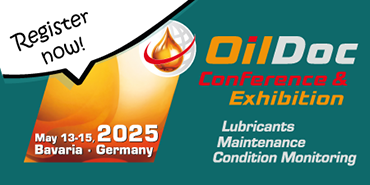The MLA (Machinery Lubricant Analyst) oil analysis specialist
The topic of lubrication and lubrication technology is usually only addressed marginally, if at all, at universities. Nevertheless, practical knowledge of lubricants, lubricant analysis, and tribology is essential in the maintenance sector for the reliable and cost-efficient operation of machinery and equipment.
Certification by the ICML (International Council for Machinery Lubrication) confirms a high level of expertise in the field of machine lubrication, especially in the context of machine condition monitoring and maintenance.
Tasks of a certified oil analysis specialist (MLA Level I or II) in the company:
The oil analysis specialist:
- installs sampling equipment so that representative oil samples can be taken repeatedly and efficiently,
- takes representative lubricant samples from typical industrial machines and prepares them for analysis,
- selects suitable analysis methods to identify and rectify faults in lubricant use,
- selects suitable analysis methods to monitor the quality of the lubricant used and prevent abnormal wear on the machine,
- evaluates the results of oil analyses from laboratories or online systems and implements appropriate measures to ensure machine availability.
- checks the receipt and proper storage of new oil deliveries.
The oil analysis specialist usually has regular contact with the machine and has an influence on the selection and condition of the lubricants and hydraulic fluids used. A basic understanding of the topics of lubrication, wear, oil analysis methods and tribology is assumed. A basic understanding of the topics of lubrication, wear, oil analysis methods and tribology is assumed.


The certification exam
For certification to MLA Level I, the participant must fulfil the following requirements:
- Training/Experience – Candidate must have 12 months experience in the field of machine condition monitoring with lubricant analysis. This assumes contact with samples and analyses of at least 16 hours/month assumed.
- Training – The candidate must have received a documented 24-hour training course in oil analysis for machine condition monitoring in accordance with the learning content of the MLA II certification (e.g. the OilDoc Academy certificate course Machine Monitoring by Oil Analysis).
Please also note the current ICML requirements for admission to the MLAI exam!!!
For certification to MLA Level II, the participant must fulfil the following requirements:
- Training/Experience – Candidate must have 24 months experience in the field of machine condition monitoring with lubricant analysis. This assumes contact with samples and analyses of at least 16 hours/month assumed.
- MLA-I certification OR at least 960 hours of experience and knowledge of MLA-I course content.
- Training – The candidate must have received a documented 24-hour training course in oil analysis for machine condition monitoring in accordance with the learning content of the MLA II certification (e.g. the OilDoc Academy certificate course Machine Monitoring by Oil Analysis).
Please also note the current ICML requirements for admission to the MLA II exam!
Examination procedure
- A desktop computer or laptop (not a tablet, Chromebook or mobile phone) with a connection to the power supply (not battery-powered) is required for online examinations
- You will also need: a working built-in or external web camera, microphone and speakers, all of which must remain switched on throughout the test
- Internet speed of at least 2 Mbps download and 2 Mbps upload; hotspots are not recommended (you can determine your Internet speed with a test at www.speedtest.net)
- Candidates must understand spoken English
You can use the ICML examity platform to choose a date when you want to take the exam. We recommend an exam date close to your OilDoc MLA certificate course. You are welcome to take the exam directly after the workshop day on the premises of the OilDoc Academy.
Each candidate must pass a written, 100-question multiple-choice exam that tests their knowledge of the subject. The examination, for which no aids are permitted, has a time limit of three hours. To successfully pass the examination and obtain certification, at least 70 % of the questions are answered correctly.
The ICML (International Council for the Lubrication of Machinery)
With its practice-oriented certification programme, it supports lubrication and maintenance specialists in successfully mastering the challenges of their daily work. The ICML plays an important role in the development and maintenance of lubrication technology standards and works closely with ANSI (American National Standards Institute) and ISO (International Organisation for Standardisation).
With the awards named after Augustus H. Gill and John R. Battle, the ICML honours outstanding achievements in the field of oil monitoring and machine lubrication. The ICML sets new standards in the benchmarking of oil monitoring and machine lubrication programmes. It promotes lubrication curricula in vocational and technical schools.
Advantages of ICML certification
All ICML examinations are application-specific and are designed to test the skills and knowledge required to properly perform machine lubrication and oil analysis tasks for the maintenance of machines and systems.
The certification:
- creates a standardised formal framework through clear learning content
- gives managers the chance to secure their knowledge
- raises the profile of specialists in the maintenance sector
- gives machine lubrication and oil monitoring more recognition
The value of ICML certificates, such as the MLA, is undisputed in English-speaking countries. In addition to respect and credibility, people who have passed the exam have often achieved a higher income in their lubricant-related work. The ICML certificates are always up-to-date because they are only valid for three years. After that, they can be renewed for another three years if certain requirements are met.

